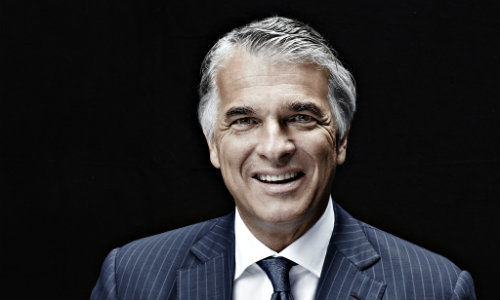UBS: Sergio Ermotti as Chairman?
Speculation over the future of Sergio Ermotti could soon come to an end. The UBS boss may not want to leave the Swiss bank at all, and instead move up a level.
Sergio Ermotti has reached the pinnacle at UBS: the Zurich-based firm has been the world's largest wealth manager for several years now, its luster restored after a series of painful and embarrassing scandals (settled with the help of more than 6 billion Swiss francs). The Swiss banker has also made UBS' domestic business into a revenue motor, and advanced the bank towards a digital future.
Ermotti can be forgiven for not landing a big coup after his dramatic 2012 move to slash its fixed income arm – the ease with which banks used to earn quick, easy wins is gone, with conditions far less friendly. At 57, Ermotti is at the perfect age to plot his next career move.
No Plans – Except UBS
Except, he doesn't want to – at least not outside of UBS. He hasn't given himself a timeline, Ermotti said last year when pressed by journalists about his plans for the future.
He left that to Axel Weber: the UBS chairman said he and Ermotti want to tag-team at the bank for another five years. Then, in 2022, Weber will have to give up the chairman's seat according to the bank's statutes.
Perfect Timing
UBS has a well-stocked bench to succeed Ermotti: potential candidates include Swiss boss Martin Blessing, operating chief Axel Lehmann and private bank boss Juerg Zeltner.
The same can't be said of the board position, so Ermotti getting bumped upstairs to the board would be perfect timing. The succession planning has apparently been in the works for some time.
Germany's «Manager Magazin» wrote in a profile of Swiss head Blessing (original item behind paywall) that the German banker could eventually succeed Ermotti as CEO. Ermotti's «career plan is to take over from Weber in 2022,» the magazine reported.
Smart Move?
The German publication assumes the Ermotti-for-Weber deal is done. A UBS spokeswoman said the bank doesn't comment on media speculation.
Whether the move would be sensible for UBS is debatable: a long-time investment banker, Ermotti's strengths are are as an operative boss, and he is untested as an overseer.
Rhetorical Brilliance
He is undoubtedly tenacious, and his management style is tough, demanding and fair. Weber, a former Bundesbanker, is known as an eloquent public speaker and intellectual; Ermotti is the «doer».
Ermotti's purported ambitions also raise the question of whether UBS needs such a large dose of continuity. The bank has plodded along as a predictable supertanker for years now. Ermotti and his management team seem to have resigned themselves that there is no antidote to the new reality of global banking, with its rising regulatory costs and falling interest income.
Growing Complacent?
Investors have found little cheer in the shares, which have tracked the bank's sideways movement. UBS runs the risk of complacency and standing still if Ermotti remains CEO for another five years and then moves upstairs.
To be sure, Ermotti has often and eloquently spoken on topics that don't directly affect UBS: he has advanced to an influential voice on economic and social topics like immigration and business in Switzerland.
Swiss Equation
It is of course up to UBS' chairman how he or she defines the job and exercises it publicly. Weber's full-court press as a commentator for financial, macroeconomic and banking topics is slightly unconventional, and will serve as a benchmark for his successor.
If Ermotti were tipped as chairman, UBS would have fulfilled the unspoken Swiss equation that is traditional for top management ranks at Swiss blue-chip firms (either chairman or CEO are Swiss).
The move would also be a return to a tradition at rigidly-structured UBS that was for the most part adhered to until the financial crisis: the «general director» or CEO usually advanced to lead the bank's board in a carefully-orchestrated but unspoken plan.


























